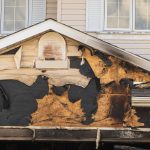How to avoid water damage (and what to do if it happens)
Chances are you’re going to have some kind of water damage at home or at work sooner or later. The water heater might leak, a pipe may burst, or water could work its way into an attic – or beyond – during a storm. The ensuing water damage cleanup can be costly and emotionally draining.
That’s why it’s wise to take steps in advance to prevent water damage or at least minimize the impact if it’s unavoidable. “Repetitive water claims can be a red flag,” adds Cook. It could indicate a persistent problem that’s going uncorrected, which could spell trouble for your insurance coverage.
How can I prevent water damage?
- Turn your home’s water off at the main before leaving for vacation. Not much can feel worse than coming home to discover water has been flowing unimpeded for days, soaking the house and your possessions.
- Keep air conditioner condensation drain lines clean to prevent overflow. It’s also extremely important to keep your HVAC unit in operation and maintain indoor humidity between 30% – 50%.
- Check washing machine hoses regularly and replace any that are frayed or cracked.
- Check for leaks around sinks and toilets, including water supply lines.
- If your refrigerator has an icemaker, check for leaks around the water supply line and look for wet spots on the floor. Replace the supply line if you find a leak.
- Your water heater must have a drain pan and you need to be sure it drains out of the house
- Inspect the bottom of the water heater regularly for rust. Repair or replace the water heater if you do find rust.
- Clean gutters regularly and make sure water flows from downspouts away from the building. (Caution: damage is not covered by insurance if this isn’t done right.)
- Install pipe boots around all vents on the roof to prevent water from entering the building.
I’ve had water damage…now what?
The first thing your agent will expect you to do is take the necessary steps to mitigate the damage and protect the property. After any damage a great question to ask yourself is, “what would I normally do if I didn’t have insurance?” Your answers will point you in the right direction.
- Time is critical – water mitigation services should be started on day 1 to minimize the damage and prevent mold.
- If a basement is flooded, do not go into the water – it could be energized by your electricity. Leave it to a professional to handle.
- Relocate any contents (furniture, boxes, etc.) from the wet area to a dry area as soon as possible. Be careful where you place them, as wet items could stain carpet. You can minimize the risk by placing aluminum foil underneath the items until a professional restoration service can arrive.
- If valuable or irreplaceable items such as books, photos, etc., are wet, rinse them with the cleanest water available (preferably distilled water) and then freeze them to preserve and stop further damage.
Best time to make a decision
Pre-qualifying and choosing a restoration contractor before disaster strikes is a good idea. After all, the best time to make a decision is NOT in the middle of the night during a crisis. It’s now, during peace and quiet.
If the unavoidable happens, BluSky will extract the water, dry your structure, and restore your contents. Call us at 888.882.5875 to learn more.


